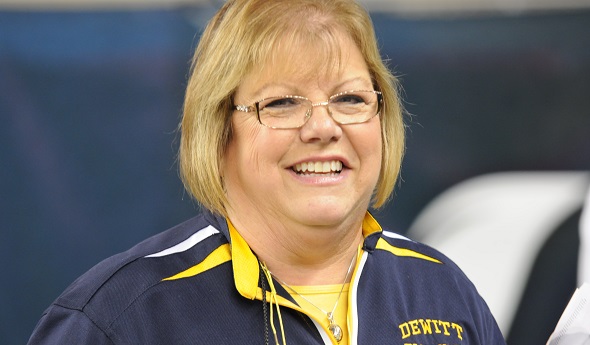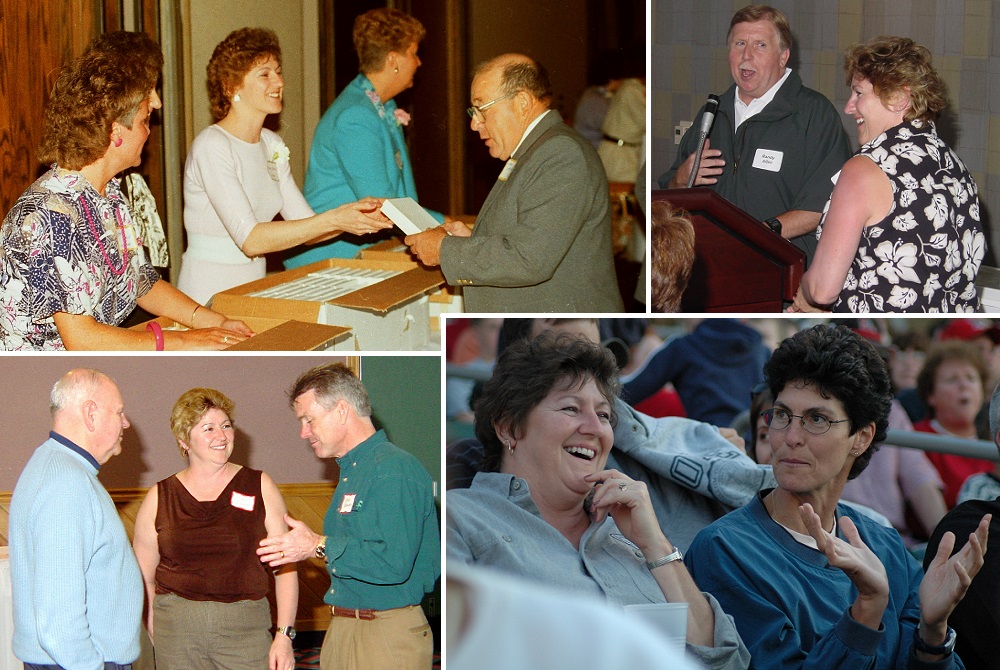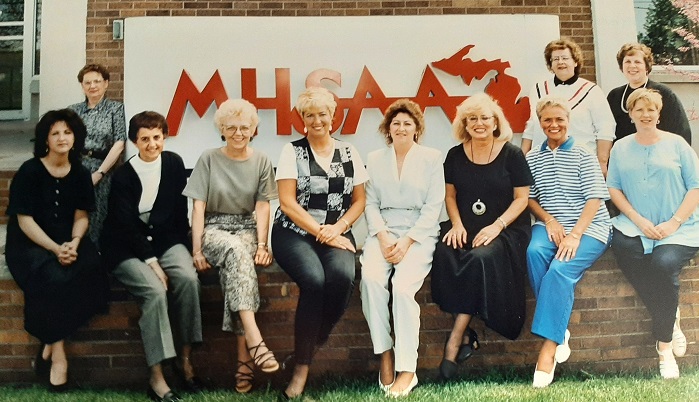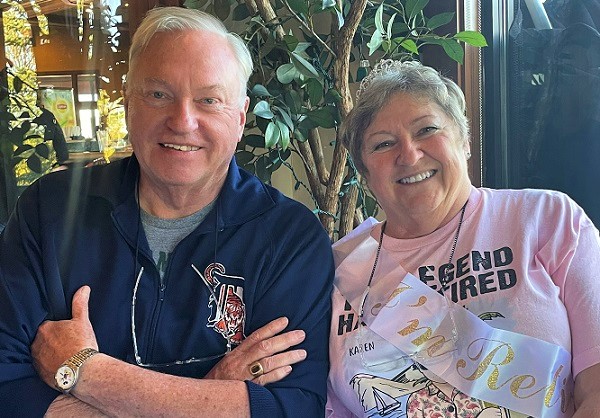
Honoree Leads from Behind the Scenes
January 28, 2014
By Geoff Kimmerly
Second Half editor
Off to the side somewhere, where athletic directors generally reside, Teri Reyburn often enjoys her favorite part of leading DeWitt’s athletic department – watching her school’s athletes shine.
As head of one of the Lansing area’s most successful programs, she has celebrated more often than not. But while her contributions to those successes usually fall outside of fanfare, they hardly go unappreciated by those who understand the inner workings of high school sports.
Reyburn's faithful support of her school and continuous service to Michigan High School Athletic Association programs will be celebrated Sunday, when she receives the MHSAA’s 27th Women In Sports Leadership Award during the WISL banquet at the Crowne Plaza Lansing West.
In addition to heading a department since 1999 that annually produces winning teams, Reyburn was a key voice in the creation and growth of the Capital Area Activities Conference a decade ago and has hosted more than 80 MHSAA tournaments at various levels in various sports.
“I absolutely love the kids. And I take a huge amount of pride in being able to put on and prepare an event, have hundreds or thousands walk in and sit down, enjoy themselves and walk out and leave not knowing the amount of work it took,” Reyburn said. “We have a large amount of volunteers who make that happen. I have some of the most amazing coaches, and the parents support their kids too. It doesn’t get any better than here, and I love what I do.”
Each year, the Representative Council considers the achievements of women coaches, officials and athletic administrators affiliated with the MHSAA who show exemplary leadership capabilities and positive contributions to athletics.
Both DeWitt’s girls and boys golf teams have won two MHSAA Finals championships apiece during her tenure. The football program has played in four Finals and both the boys basketball team and competitive cheer teams have finished MHSAA runners-up.
The Panthers girls basketball team has advanced to three MHSAA Semifinals, and the boys and girls soccer teams and baseball team have combined for five Semifinal appearances during her time guiding the program.
DeWitt has a strong athletic tradition going back decades. But there’s no question Reyburn has played her part well in continuing that legacy.
“DeWitt teams are always hard-working and always the model of good sportsmanship. Many people would assign the credit to the coaches for such behavior,” wrote Lansing Catholic athletic director Rich Kimball is recommending Reyburn for the WISL award. “Having been a coach, I know they deserve a lot of credit for how their teams perform and act, but without the leadership from the ‘boss’ those things don’t usually happen. Teri makes sure her program operates with class at all times.”
Her contributions to athletics off the field of play have been similarly significant, if also understated.
Since taking over the DeWitt program as interim athletic director in March 1999, and then fulltime that summer, Reyburn regularly has hosted five MHSAA tournaments per school year plus a total of more than 20 rules meetings and a number of clinics in coordination with statewide coaches and officials associations.
Reyburn, 59, also was among athletic directors who played a significant role in the formation of the CAAC, which combined schools from four leagues into one in 2003. She also was a leading voice in the formation of DeWitt High School’s Hall of Fame, which has inducted 35 athletes and nine teams since 2008.
Reyburn has spoken at WISL conferences on both the role of Title IX in high school athletics and “Tackling the Media Blitz” for young coaches and athletes. She has served on the WISL planning committee as well as on Scholar-Athlete Award, athletic equity, competitive cheer rules, site and officials selection committees.
“Teri Reyburn has provided nearly two decades of quiet, steady leadership in her school district and serves as a mentor for those who are following her in the athletic director role,” said John E. “Jack” Roberts, executive director of the MHSAA. “She’s a role model for not just women, but anyone who aspires to a career in educational athletics. We’re pleased to honor her with the Women In Sports Leadership Award.”
Reyburn graduated from Cedar Springs High School in 1972, the same year as the enactment of Title IX and the first MHSAA tournaments in girls sports. Her school offered three sports, and she played intramural volleyball and was a cheerleader. She also was a championship-caliber horseback rider during high school summers.
Soon after graduation, Reyburn married her high school sweetheart Kris (they will celebrate their 41st anniversary in November). Hers sons were born not long after – Mike, now a lieutenant colonel in the U.S. Army stationed in South Korea, and then D.J., who will begin his first fulltime season as a Major League Baseball umpire this spring.
Reyburn took college classes, worked as a study hall aide at Cedar Springs and later served on the Portland Public Schools board of education for 11 years before her family moved to DeWitt. She had intentions of earning a college degree, and discussed the possibility again after joining DeWitt schools a media specialist, middle school sports coordinator and assistant to the high school athletic director in 1994. But after five years in those roles, a sad circumstance led to her taking over the DeWitt program fulltime.
She was brought into athletics initially by previous director Jim Lutzke, who also worked in the human resources department and served as the Panthers boys basketball coach. He relied on Reyburn to coordinate middle school events and serve as a game manager for many at the high school.
Lutzke was diagnosed with cancer early in the 1998-99 school year, and Reyburn took on additional roles including game setup and equipment ordering. Lutzke died that March, and Reyburn and girls basketball coach Bill McCullen took over the high school athletic director duties on an interim basis. She was then hired as Lutzke’s successor for the following fall – and continues to employ lessons she learned under his mentoring.
“The biggest thing I got from Jim was just learning not to react quickly. To think, to understand a situation and know all of the facts before I do anything,” Reyburn said. “Jim was extremely good at that. He was even keel and level with everything he did.”
Reyburn also received plenty of tutelage and support from local athletic directors including longtime Haslett leader Jamie Gent, Williamston’s Jeff Lynch and then-Fowlerville athletic director Jack Wallace.
Now Reyburn is among those passing the knowledge forward. She’s one of the longest-serving athletic directors in the CAAC and was recognized as her region’s Athletic Director of the Year in 2006 by the Michigan Interscholastic Athletic Administrators Association.
“There are few, if any, athletic directors who are more capable, more organized or more in touch with high school sports than Teri,” Lansing Catholic’s Kimball also wrote. “Teri is the perfect person to win this award – passionate, smart, humorous, organized, but most of all an advocate for educational athletes.”
Past Women In Sports Leadership Award recipients
1990 – Carol Seavoy, L’Anse
1991 – Diane Laffey, Harper Woods
1992 – Patricia Ashby, Scotts
1993 – Jo Lake, Grosse Pointe
1994 – Brenda Gatlin, Detroit
1995 – Jane Bennett, Ann Arbor
1996 – Cheryl Amos-Helmicki, Huntington Woods
1997 – Delores L. Elswick, Detroit
1998 – Karen S. Leinaar, Delton
1999 – Kathy McGee, Flint
2000 – Pat Richardson, Grass Lake
2001 – Suzanne Martin, East Lansing
2002 – Susan Barthold, Kentwood
2003 – Nancy Clark, Flint
2004 – Kathy Vruggink Westdorp, Grand Rapids
2005 – Barbara Redding, Capac
2006 – Melanie Miller, Lansing
2007 – Jan Sander, Warren Woods
2008 – Jane Bos, Grand Rapids
2009 – Gail Ganakas, Flint; Deb VanKuiken, Holly
2010 – Gina Mazzolini, Lansing
2011 – Ellen Pugh, West Branch; Patti Tibaldi, Traverse City
2012 – Janet Gillette, Comstock Park
2013 – Barbara Beckett, Traverse City
PHOTO: DeWitt athletic director Teri Reyburn walks the Ford Field sideline before the Panthers Division 3 Final against Zeeland West this fall. (Click to see more at HighSchoolSportsScene.com.)

Jackson's Imprint on MHSAA Stretches 45 Years, Across 4 Executive Directors
By
Geoff Kimmerly
MHSAA.com senior editor
October 5, 2022
First impressions can be significant, as many a saying goes. And Karen Brown unknowingly provided one in 1978 that helped affect the course of athletics in this state over the next 40-plus years.
A Michigan State University student named Karen Leinaar had shown up at the Michigan High School Athletic Association for a meeting about a 5K road race she was planning that was unrelated to the MHSAA except that the building provided a good meeting place – and Brown, just a year out of high school, was the first person to greet her at the old Trowbridge Road headquarters.
Seeing someone her age immediately made Leinaar more comfortable. She ended up returning to that office several times over the years, registering as an MHSAA game official while still an MSU student and then starting a career in 1982 that has included nearly 40 years as a high school athletic director and two decades of shaping policy as part of the MHSAA Representative Council.
That’s the kind of impact that’s emanated from Karen Jackson, formerly Brown, and over the last 45 years as assistant to four of the five executive directors during the MHSAA’s 98-year history. Jackson finished that run with her retirement Friday.
“She was always one that would welcome you, and whether you walked into the office or called on the phone, she always had an answer that would calm you down or provide you with the information you needed,” said Leinaar, who currently is serving as interim athletic director at Frankfort High School in addition to her duties as executive director of the Michigan Interscholastic Athletic Administrators Association.
“I remember initially calling and needing something from Mr. Norris – it was always Mr. Norris – and she could answer the question,” Leinaar added, referring to retired MHSAA executive director Vern Norris, who served in that role from 1978-86. “You didn’t want to talk to scary Mr. Norris – Vern was a wonderful man, but he was like the superintendent or principal. Karen always had the answer. … It was always that smile that made you feel like you were more than welcomed, wanted in the office, and everything is going to be OK.”
 Jackson began at the MHSAA in June 1977, two days before her graduation from long ago-closed Harry Hill High School in Lansing.
Jackson began at the MHSAA in June 1977, two days before her graduation from long ago-closed Harry Hill High School in Lansing.
Her high school sports career amounted to about half a season on the Hill varsity volleyball team as a sophomore before she had to switch gears to begin working for the Lansing Regional Chamber of Commerce as part of a school co-op program.
Jackson graduated as a co-valedictorian of Hill’s Class of 1977. Despite her academic standing, she hadn’t received much guidance at school on the possibility of college. But she had a job offer from the Chamber – and also had heard from grade-school friend Deborah Norris (Vern’s daughter) about an opening at the MHSAA.
The MHSAA was offering more money, and Jackson was hoping to buy a car – and so at 18, she became the secretary for executive director Allen W. Bush.
The title has changed over the years, from secretary to the executive director, to executive assistant, to senior executive assistant. The MHSAA’s administrative processes obviously have changed, mostly because of technology, from everything done on paper and through the mail to just about everything conducted digitally over the internet.
But many of Jackson’s most important duties at the end of her tenure resembled those she was hired to carry out nearly half a century ago.
Setting Exemplary Expectations
Bush retired a year after Jackson began, and she then assisted Norris for his eight as executive director. She served with Jack Roberts through his 32 years as executive director from 1986-2018 and then for these first 3½ under current director Mark Uyl.
She was considered the “baby” of the MHSAA staff during her first 12 years, until she turned 30 and her support staff teammates declared she wasn’t the baby anymore during a Christmas party serenade. Just about 33 years later, she’s leaving as one of two people left who worked in the old offices before the MHSAA moved to another East Lansing headquarters at Ramblewood Drive in 1996.
School sports happen thanks to a Karen Jackson or two in every community -- people who provide the unseen support that makes these programs possible every day.
For the last 45 years, she’s provided a consistent anchor for service to 1,500 schools and millions of student-athletes across Michigan.
 “She’s shaped so much of what we’ve done,” said MHSAA assistant director Kathy Vruggink Westdorp, who joined the staff during the 2003-04 school year after more than two decades working for Grand Rapids-area schools. “Her service to schools was imperative to what she was doing, and it was a valuable part for our membership. Hers was such a dedicated service, such an exemplary service – finding solutions, to do what’s needed.”
“She’s shaped so much of what we’ve done,” said MHSAA assistant director Kathy Vruggink Westdorp, who joined the staff during the 2003-04 school year after more than two decades working for Grand Rapids-area schools. “Her service to schools was imperative to what she was doing, and it was a valuable part for our membership. Hers was such a dedicated service, such an exemplary service – finding solutions, to do what’s needed.”
There are file cabinets and libraries and hard drives at the MHSAA office, the contents of which are known by only a handful of people on Earth – and Jackson perhaps the most as she did most of the sorting and maintaining of those files over the years.
For a 1996 Lansing State Journal feature on the MHSAA’s support staff, Jackson (then Yonkers) explained “there are always new challenges, new issues and controversies. It never gets boring. In the past 19 years, we’ve slowly shifted from dealing with athletic administrators, principals and superintendents to dealing with legislators, attorneys and courts.”
The last 25 years has seen much of the work swing back to providing service directly to schools. And Jackson’s mind has become part MHSAA library and part card catalog of where to find those few snippets she might not recall immediately from the last half century.
“I guess what I’m proud of is being able to find things, to know where to find things and how to find things that other people don’t,” Jackson said. “Yes, the technology has changed everything. … We used to have more schools – they used to have 40-some Detroit public schools – and there was a whole era of (litigation), but it’s calmed down now.
“I liked what I did, and it kept me on my toes – that’s for sure.”
The MHSAA is rooted in its responsibilities as a championship and eligibility rules maker, and Jackson was involved in just about every communication in those areas during her time. Tournament changes are made at Representative Council meetings, and she’s reported the minutes for at least 150 of those, including piles of special sessions as the MHSAA managed sports through the COVID-19 pandemic. Eligibility waivers are requested at Executive Committee meetings, and she’s prepared somewhere north of 505 sets of minutes for those monthly sessions even as those agendas have grown in content substantially over the years.
Then there’s all of the correspondence from those four executive directors – all with the initials “kb” or “kj” to go with “AWB” or “VLN” or “JER” and “MU.” She also was in charge of MHSAA election ballots for 35 years, served as the lead organizer of cooperative programs, helped with football tickets for a time and briefly was part of the program-selling crew at early Football Finals at the Pontiac Silverdome.
“I think I’m pretty lucky, being on the Council and Executive Committee, that I’ve been able to work with her a lot. And most athletic directors, they may not even know who she is because they may not have contact with her or do anything with her – but she’s obviously been the unsung hero of that office,” said Vic Michaels, who serves as director of physical education & athletics for the Archdiocese of Detroit and has served on the Representative Council since 2003.
“She just does so much that you don’t really know about, especially with the Council. Whenever I need anything, Karen’s the one I call. She is the history, really. She’s the keeper of that.”
Unprecedented & 'Never to be Replicated'
A longtime co-worker of Jackson, Shirley Hytinen, retired in 1998 after just a few months more than 43 years. She too had worked for four executive directors, as she began in 1955 during the Charles E. Forsythe era.
Jackson surpassed Hytinen’s tenure a few years into Uyl’s, and can readily recall some of what stood out from all four directors she’s assisted.
Bush was “really stern” – he had served in the U.S. Marines – and she said he didn’t smile much until the day he announced his retirement, when it was “like a switch turned. He was smiling and happy and joking around.”
Norris was “the sweetest guy in the world.” Jackson had bought her first house in her mid-20s and was preparing to move in with only her dad and his motor home to assist, when Norris showed up to help at 7:30 a.m. that morning to provide another set of hands.
Roberts is known by Michigan administrators and national colleagues for his writing, and Jackson said jokingly she still “cringes” when she sees a yellow legal pad. She was an important proofreader and spent the majority of her career serving with her desk just a few paces away from that of the recent National Federation Hall of Fame selection, and she attended his induction this past summer and San Antonio.
 Roberts pointed out that during the 1980s, the MHSAA would conduct nine Executive Committee meetings, each averaging fewer than 10 requests for waivers. By the end of his 32 years, there were 11 Executive Committee meetings annually – with approximately 50 waiver requests presented on average. Still, he and Jackson were able to process the meeting minutes and continue to distribute those decisions within 24 hours.
Roberts pointed out that during the 1980s, the MHSAA would conduct nine Executive Committee meetings, each averaging fewer than 10 requests for waivers. By the end of his 32 years, there were 11 Executive Committee meetings annually – with approximately 50 waiver requests presented on average. Still, he and Jackson were able to process the meeting minutes and continue to distribute those decisions within 24 hours.
“Over the more than three decades that Karen and I worked together at the MHSAA, the work became increasingly more voluminous and complicated – and Karen kept finding ways to increase our efficiency and maximize our output,” Roberts said.
Like Norris when Bush was executive director, Uyl had been part of the MHSAA staff under Roberts since 2004 before eventually moving into the corner office. After those first 15 years together, Uyl knew what a valuable person he had just a few yards away to assist in his transition, and “he just says to do this” and allows his staff to run with it, which Jackson enjoyed.
Her duties have been shifted confidently, mostly to Jamie VanDerMoere, another longtime administrative assistant who is best-known to Michigan school sports people for her leadership with the annual wrestling championship tournaments.
Jackson recently was married to Jim Jackson, and they have plans as they close in on their first anniversary – they’re hoping to travel to Italy at some point and also The Masters in Augusta, Ga., next spring. “I’m not going to miss coming to work every day, but the people,” Karen Jackson said.
And many in school sports across Michigan, although they may not realize it, will miss the contributions Jackson has made to their community over the decades including the context she’s provided as thousands of decisions have been made.
“Not only her understanding of our regulations and the processes of our regulations, but understanding why we have those things in place – when someone does something 45 years, you get a lot of historical context,” Uyl said. “What’s made her so effective is understanding the why – and that to me is something that’s almost impossible to replace.
“When an organization has been around 98 years with only five directors, it says something to have worked for four out of the five. That will never be replicated again.”
PHOTOS (Top) From top left, Karen Jackson has been a mainstay of the MHSAA for decades – serving membership, working with administrators like Randy Allen and Gina Mazzolini or serving as assistant to executive directors like Jack Roberts (right) and Vern Norris. (Middle) Jackson, sitting fourth from left, was the “baby” of the MHSAA staff after joining when she was 18. (Below) Jackson and husband Jim have plans to travel in retirement. (MHSAA archives.)

